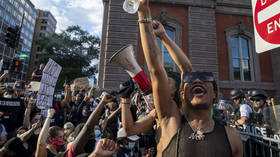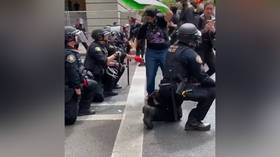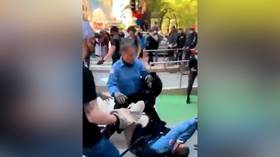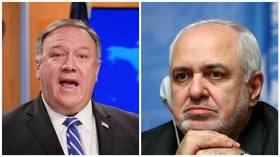Russian media’s muted coverage of US riots: Sorry America, the world doesn't revolve around you

Many American pundits and pontificators are telling their followers, readers, listeners, and viewers that the Russian press is lapping up – and exploiting – the current violent disorder in the US. This isn't true.
For the past few days, as uproar rages across America, various prominent folk have reached for the usual ‘blame Russia’ deflection technique. Some of it has been quite demented.
Ranging from people claiming that Russian news reporters covering the events are actually orchestrating them, to others alleging the whole thing is a dastardly Kremlin plot. Or a “Russian intelligence” operation, to be precise.
Many people genuinely believe that Russia ordered white American Minneapolis police officer Derek Chauvin to choke African-American civilian George Floyd to death. This account has almost 100,000 followers. There really are no words. https://t.co/8NwLRxyt03
— Bryan MacDonald (@27khv) May 31, 2020
As if Putin himself ordered white American Minneapolis police officer Derek Chauvin to choke African-American civilian George Floyd to death in broad daylight.
Others say the Russian president “hoped” for events such as these when he “backed” Donald Trump’s Presidential bid in 2016. Just like what happened in Ferguson (Michael Brown) in 2014 was Putin's wish when he was friendly to Barack Obama. Indeed, by this kind of logic, the 1992 Los Angeles riots (Rodney King) were inspired by Putin's high regard for Bill Clinton.
Just as what happened in Ferguson (Michael Brown) in 2014 was what Putin hoped for when he backed Barack Obama. And the 1992 Los Angeles riots (Rodney King) were what Putin hoped for when he backed Bill Clinton. Clearly a pattern there, @andylassner. https://t.co/x6ReFDk4XF
— Bryan MacDonald (@27khv) May 30, 2020
Another group have tried to compare the grotesque violence seen across the US with last year’s Moscow protests. Which is like trying to equate gate-crashing a Teddy Bear’s picnic to becoming an actual bear’s picnic.
Seva Gunitsky, a Canada-based academic probably put it best when he tweeted that “Russia is not really a place anymore but a psychological coping mechanism.”
The other weird weekend trope has been the idea that Putin is “smiling,”“laughing” or “happy” over the breakdown of order in the US. Added to the chorus claiming Russian media is going to town on coverage.
It’s true that RT has covered it widely. But RT is an International broadcaster, so it would be far stranger if this network ignored it. Concerns of this nature are amusing considering how American journalists – and state officials – relish protests elsewhere in the world. Especially in ‘bad’ countries.
With all this in mind, it’s useful to see if Russian media really is giving extensive coverage to the US protests.
Federal TV channel Russia-1, on Sunday night, didn't pull its punches. "If something like this had happened in Russia, new sanctions would have been slapped on us and the Americans would have called an emergency session of United Nations Security Council to discuss the human rights situation in Russia," host Dmitry Kiselyov said in his introduction. "But since this is America, and this kind of treatment of blacks is standard practice, nobody in the world batted an eyelid."
Following that sensationalist introduction - which is a trademark of the show Vesti nedeli (News of the Week) - the subsequent, on the ground, report was very balanced.
On Monday, Kommersant, an independent daily, didn’t even mention the US crisis in its main headlines. Instead, coverage was buried down in the World News section, with the focus on how ‘America is beginning to get tired of riots.’ Reporter Alexey Naumov told his readers “calls for an end to the atrocities are heard from both sides of the political spectrum and from representatives of the general public all around the country, but there is no end to the violence.”
Hardly full-on agitprop.
Russia’s best-selling newspaper, Moskovskij Komsomolets, again ignored the US story at the top of its homepage. Further down it carried an interview with Valery Garbuzov, a Russian scholar focused on North America. He said that “crime, drug addiction, and alcoholism” greatly affect the black community in the US, explaining that “the American state has been trying to solve this problem for decades.” Adding how African Americans hate Trump “with all the fibers of their souls” because of his reputation as a racist.
At RIA Novosti, one of the main state-backed news organizations, the events were given more prominence. But the angle was about how many in the US are blaming Russia. In an op-ed Victor Marakhovsky especially focused on CNN, saying its relations with Trump are “generally slightly worse than Iran and Israel.” The writer added that the “loss of global political and economic, and perhaps power leadership” is causing Americans to blame external forces for their home-grown problems.
Pro-Kremlin tabloid Komsomolskaya Pravda had two foreign-news stories in its main headlines. One was a report on the “Balkan Miracle,” hailing former Yugoslav countries (such as Serbia and Croatia) for their responses to Covid-19. The other was an interview with the Italian Ambassador to Russia Pasquale Terracciano, who has thanked Russia for its help in the fight against coronavirus in his country.
The first mention of the US riots was around thirty articles down and emphasized reports from US media that Trump hid in a bunker “from the American Maidan.” In Russia, ‘Maidan’ has become shorthand for any sort of major political protest, since the violent 2014 events in Kiev which brought a pro-Western government to power in Ukraine. Reporter Edward Chesnkov asked Yaroslav Levin, described as an expert on America, how the instability might affect relations with Russia. “Susan Rice, a former national security adviser to Barack Obama, stated that ‘Moscow is behind the riots.’ If the situation does not stabilize, the idea voiced by Rice could be adopted by all who benefit from playing the ‘Russia card’ in the upcoming presidential election,” he said. “And Trump, to save face, will be forced to demonstrate a hard line towards Moscow (at least in words).”
Again, pretty reasonable stuff. The fact is that Russians are not hugely interested in US domestic affairs. They have enough problems of their own and their media is not rejoicing in America’s current difficulties. Mainly because most of its readers couldn’t care less.
As Irish singer Bono once crooned “when I was three I thought the world revolved around me… I was wrong.” Sadly, many Americans genuinely believe the rest of the planet’s primary focus is on their country. It’s not, and they need to get over themselves.
Think your friends would be interested? Share this story!















